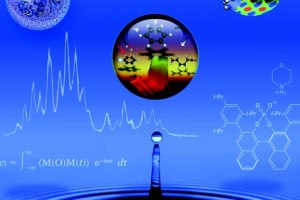



Flagship Program Solvation Science
The mission of the cluster and Flagship Program is to develop Solvation Science as a new interdisciplinary field to understand the influence of solvation on reactions, on the function of biomolecules, and on processes at liquid/solid interfaces. Started in 2012, RESOLV is now the leading research institution in Solvation Science on a national level and one of the top players worldwide.

Financed by the DFG Excellence Initiative, the research cluster and UA Ruhr Flagship Program RESOLV (Ruhr Explores Solvation) brings together international and regional partners to continuously enhance its research capacities and cement its position among leading research institutions worldwide.
You will find an apt description of RESOLV in the video clip of renowned science journalist and former editor of the journal Nature: Philip Ball about Solvation Science and Ruhr Explores Solvation.
About the Flagship Program RESOLV
Most chemical reactions, crucial industrial processes and almost all biological processes take place in the liquid phase. A profound understanding of solvation is going to effect a radical change in numerous key technologies, those including green chemistry and electrochemistry. It is essential for optimizing industrial processes, reducing environmental stress, improving energy efficiencies, understanding biological processes and preventing corrosion.
At present, time-consuming series of experiments are necessary in order to identify the right solvent for a process. Solvation Science aims at developing a standardized model capable of predicting solvation processes.
More than 50 scientific working groups – approx. 200 members in total – have bundled their strengths in the RESOLV Cluster of Excellence and in the UA Ruhr Flagship Program, for the purpose of developing a bottom-up understanding of solvation. Spread across seven institutions in Metropolis Ruhr, they expand the borders of science.
In 2015, the sister organization CALSOLV (California Explores Solvation) was set up at the University of California, Berkeley. Teams on both sides of the Atlantic have been collaborating closely ever since. More than 80 PhD students have joined the integrated RESOLV Graduate School Solvation Science (GSS). They work in international teams and spend three months as visiting researchers at one of 20 international partner institutions affiliated with RESOLV International Faculty. In the TranSOLV project, research results are actively converted into industrial applications.
The research strategy of RESOLV departs from the traditional, empiric and macroscopically describing approach. RESOLV is developing a standardized universal and comprehensive bottom-up framework. The aim is to develop predictive Solvation Science, based on a molecular understanding of the processes. To this end, the molecules of the solvent in solvation processes are not regarded as passive observers of a reaction, but as functional components and active or reactive species.
RESOLV tackles scientific challenges by combining cutting-edge experimental, spectroscopic and synthetic technologies with the latest in computer simulation. A profound understanding of solvent phenomena on a molecular level will have a bearing on numerous applications, those including corrosion prevention in steel, development of biosensors, preparing the biomass in raw materials for chemical processes, the development of microcapsules for controlled release of active ingredients in drugs, cleaning processes for liquids, high-tech batteries, and green asymmetric organocatalysis.
RESOLV is part of a tightly-knit network in Metropolis Ruhr: three Max Planck Institutes, i.e. Max Planck Institute for Coal Research, Max Planck Institute for Iron Research and Max Planck Institute for Chemical Energy Conversion, Fraunhofer Institut UMSICHT, as well as three UA Ruhr universities constitute this Flagship Program. More than 200 scientists work hand in hand in RESOLV. They discuss the results of their research at regular intervals at conferences and in numerous publications.
All partners of the Flagship Program operate state-of-the-art facilities, equipped with the latest in experiment and simulation technology. RESOLV attracts leading scientists from all four corners of the globe. The initiative continuously furthers and expands its research endeavors. Spring 2016 saw the inauguration of the new research building ZEMOS (Centre for Molecular Spectroscopy and Simulation of Solvent-directed Processes).


